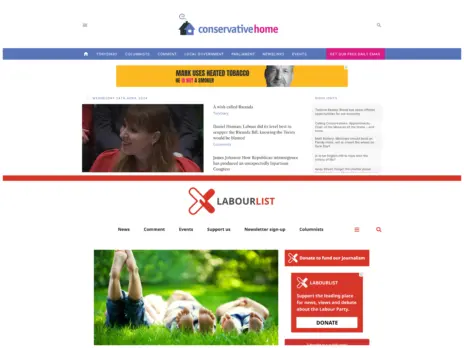
The Government’s proposed online safety laws pose “profound dangers to press freedom” and could create “unintended consequences for freedom of expression,” groups representing the UK media have said.
The proposed regulatory framework, published in a White Paper in April, will impose a statutory “duty of care” on companies that allow users to share or discover user-generated content or interact with each other online – a definition that covers social media, search engines and news websites.
Compliance would be monitored by either a new regulator or an existing one, such as Ofcom, which would be given additional powers.
Firms must take reasonable steps to keep their users safe online and tackle illegal and harmful activity on their platforms or face heavy fines and even personal criminal liability for senior management.
Groups such as the News Media Association, Society of Editors, freedom of expression organisation Article 19 and the UK’s two press regulators raised concerns to the Government in their submissions to the White Paper consultation, which closed yesterday.
The Digital Culture, Media and Sport Committee said it was “pleased” a number of recommendations from its report into disinformation and “fake news” were included, but raised concerns at the “scant focus” on electoral interference and online political advertising, both issues it said needed “urgent action”.
The committee also said it should have a statutory veto over the appointment and dismissal of the potential new regulator’s chief executive, a suggestion dubbed “sensible” by the Times in its leader column on the issue today.
In their submissions, the News Media Association and Society of Editors both called for a total exemption for journalistic content to be written into the legislation.
“Otherwise publishers would be placed in ‘double jeopardy of censorship and sanction’ as both user generated content on their own websites and journalistic content distributed via the social networks would be directly impacted,” the NMA said.
Society of Editors executive director Ian Murray said: “While we accept that the present government is sincere in its wish to protect a free, vibrant and plural media in the UK, the proposed law to restrict online harms runs the risk of creating the unintended consequence of a means for a regime hostile to the press to attack its vital online presence.
“We are calling for irreversible clauses in the proposed law that exempt the media from this legislation, but also for steps to be taken to ensure freedom of expression is not harmed in a wider sense.”
Culture Secretary Jeremy Wright has already written to the Society of Editors promising the proposed new regulator will not step on the toes of the UK’s existing press watchdogs.
The Times said Wright’s assurance was “welcome but does not address real concerns about the muscularity of the regulation”.
“As things stand, all media outlets with space for user comments could be considered platforms under the proposals,” the newspaper continued.
“That could include sites like that of the Times, which may find itself under pressure to quieten or kill the often lively debates that take place under articles online.”
The Government “must be clearer” on how it will fullfil its promise not to compete with existing press watchdogs, the Times added.
The Independent Press Standards Organisation, the UK’s largest press regulator, said in its submission that the proposals could create “both regulatory duplication and unintended consequences for freedom of expression”.
Putting publications regulated by IPSO under the regulations would be “disproportionate”, it added.
It said it would also welcome further clarification on the scope of the legislation, “particularly that our member publications would not be required to pre-moderate all user-generated comments to avoid falling under the scope of the proposals”.
The regulator also warned the legislation should not “fetter public interest reporting on potentially harmful content available online”.
Impress, the only Royal Charter-backed press regulator, said a new watchdog must be “tightly focused on the procedural responsibilities of platforms”, remain independent of Parliament, and apply only to social media platforms and not news publishers.
Impress chief executive Jonathan Heawood said: “A regulatory framework that fails to differentiate between publishers and platforms would harm the plurality and diversity of the media economy, and limit freedom of expression.”
Meanwhile Article 19 warned the Government that its proposals “pose a significant threat to freedom of expression in the UK”, partly because they cover ill-defined “legal but harmful” content.
It is also “concerning” that press will only be excluded if they are members of IPSO or Impress, the group went on, saying this would mean “the individuals that allow interactions of others on their websites would be subject to stricter regulation and requirements than major new media outlets”.
Article 19 also dubbed the proposed sanctions, which include blocking non-compliant websites, as “far-reaching and unlikely to meet the proportionality test under international human rights law”.
Executive director Thomas Hughes said: “While social media companies should be transparent and accountable for their practices, the Government’s proposals will encourage the censorship of legitimate expression.”
A Government response to the consultation is expected by the end of the year with legislation to tackle online harms set to be introduced as soon as possible in 2020, according to a spokesperson.
Picture: Lisa Fotios/ Pexels
Email pged@pressgazette.co.uk to point out mistakes, provide story tips or send in a letter for publication on our "Letters Page" blog






